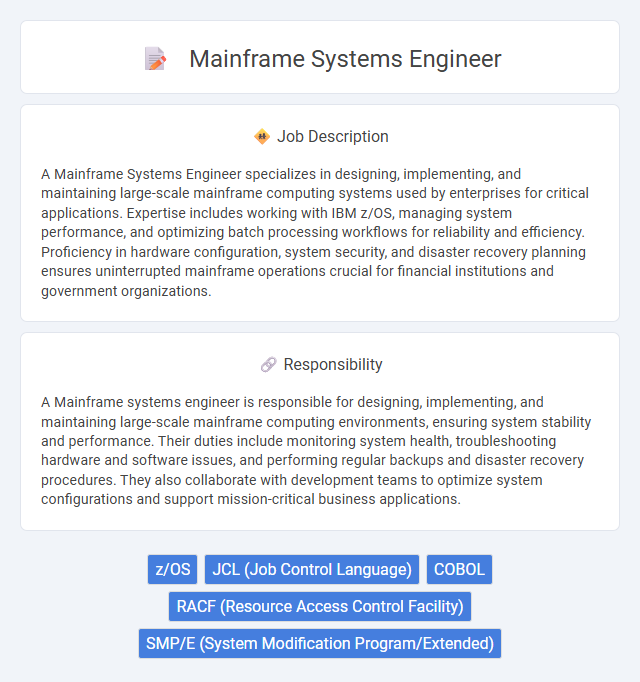
A Mainframe Systems Engineer specializes in designing, implementing, and maintaining large-scale mainframe computing systems used by enterprises for critical applications. Expertise includes working with IBM z/OS, managing system performance, and optimizing batch processing workflows for reliability and efficiency. Proficiency in hardware configuration, system security, and disaster recovery planning ensures uninterrupted mainframe operations crucial for financial institutions and government organizations.
Individuals who are detail-oriented, analytical, and comfortable working with legacy technologies are likely to find a mainframe systems engineer role suitable. Those who thrive in structured environments and enjoy problem-solving under pressure may have a higher probability of success in this field. People who prefer rapid technological changes or less rigid systems might face challenges adapting to the stability-focused nature of mainframe engineering.
Qualification
A Mainframe Systems Engineer typically requires a bachelor's degree in computer science, information technology, or a related field, coupled with extensive experience in mainframe environments such as IBM z/OS. Proficiency in languages like COBOL, JCL, and familiarity with security protocols, system performance tuning, and batch processing is crucial. Certifications such as IBM Certified System Administrator or similar credentials enhance job prospects and validate specialized expertise.
Responsibility
A Mainframe systems engineer is responsible for designing, implementing, and maintaining large-scale mainframe computing environments, ensuring system stability and performance. Their duties include monitoring system health, troubleshooting hardware and software issues, and performing regular backups and disaster recovery procedures. They also collaborate with development teams to optimize system configurations and support mission-critical business applications.
Benefit
Mainframe systems engineer roles likely offer substantial benefits including high job security due to the specialized skill set required and the critical nature of mainframe systems in many large organizations. Competitive salaries and comprehensive health and retirement plans may also be common advantages. Opportunities for continuous learning and career advancement in a stable industry could further enhance the appeal of this position.
Challenge
Mainframe systems engineer roles likely involve complex problem-solving and require deep expertise in legacy and contemporary mainframe technologies. The challenge may center on maintaining system reliability while integrating modern solutions to meet evolving business demands. This position probably demands strong analytical skills to troubleshoot critical issues swiftly and ensure continuous system performance.
Career Advancement
Mainframe systems engineers play a critical role in managing enterprise-level computing environments, making their expertise highly valuable for organizational stability and growth. Career advancement opportunities include moving into senior technical specialist roles, IT management positions, or transitioning to cloud integration and cybersecurity domains due to increasing hybrid infrastructure demands. Developing skills in automation, DevOps, and modern mainframe languages like COBOL and REXX significantly enhances promotion prospects and salary growth in this specialized field.
Key Terms
z/OS
A Mainframe Systems Engineer specializing in z/OS manages and maintains IBM mainframe environments to ensure high availability, performance, and security. Expertise in z/OS system installation, configuration, performance tuning, and troubleshooting is essential for optimizing mainframe operations. Proficiency in JCL, TSO/ISPF, and RACF supports effective job scheduling, resource management, and data security in enterprise-level IT infrastructures.
JCL (Job Control Language)
A Mainframe Systems Engineer specializes in designing, implementing, and maintaining large-scale enterprise systems using Job Control Language (JCL) to automate batch processing jobs. Mastery of JCL allows efficient scheduling, execution, and management of complex workloads on IBM z/OS platforms, ensuring optimal resource allocation and job dependencies handling. Expertise in troubleshooting JCL scripts and optimizing job streams directly enhances system performance and reliability in critical business environments.
COBOL
Mainframe systems engineers specializing in COBOL design, develop, and maintain critical business applications on IBM Z platforms. Expertise in COBOL programming, JCL, and DB2 databases ensures efficient batch processing and transaction handling for large-scale enterprises. Strong problem-solving skills and knowledge of VSAM file management optimize system performance and reliability.
RACF (Resource Access Control Facility)
A Mainframe Systems Engineer specializing in RACF (Resource Access Control Facility) is responsible for managing and enforcing security policies on IBM mainframe environments, ensuring controlled access to critical resources and sensitive data. Proficiency in RACF commands, profile administration, and auditing is essential to maintain compliance with organizational security standards and prevent unauthorized access. Expertise in integrating RACF with other mainframe security tools and troubleshooting security-related incidents enhances system reliability and safeguards enterprise information assets.
SMP/E (System Modification Program/Extended)
A Mainframe Systems Engineer specializing in SMP/E manages software updates, patches, and maintenance on IBM mainframe environments, ensuring system stability and compliance through precise change control. Expertise in SMP/E enables efficient application and rollback of system modifications, minimizing downtime and enhancing operational reliability. Proficiency with SMP/E processes is critical for maintaining seamless integration of new releases and resolving compatibility issues within complex mainframe infrastructures.
 kuljobs.com
kuljobs.com